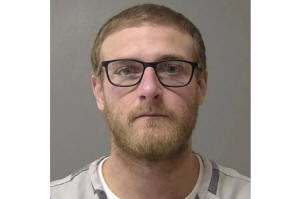|
Grayson and another deputy answered Massey’s emergency call
reporting a prowler outside the 36-year-old woman's home early
on the morning of July 6, 2024. They entered the house and,
spotting a pan of hot water on the stove, Grayson ordered it
removed, according to the other deputy's body camera video,
which was key evidence.
Grayson and Massey joked about how Grayson moved away as Massey
moved the hot pan. Then, Massey said, “ I rebuke you in the name
of Jesus,” Grayson yelled at her to drop the pot and threatened
to shoot her. Massey apologized and ducked behind a counter.
“She makes it abundantly clear, ‘I want no part of this. Let
this be done,’" Sangamon County First Assistant State's Attorney
Mary Beth Rodgers said in her closing argument.
Defense attorney Daniel Fultz beseeched the jury to decide how
Grayson felt in the moment, “not to sit back 15 months later and
say, ‘This is what I would have done.’”
“It is true that she put the pot down. If it ended there, we
wouldn't be here today, but for reasons we'll never know, she
reacquired the pot, stood up and threw it in his direction,”
Fultz said. "Only at that time did he fire his weapon.”
Massey’s killing raised new questions about U.S. law enforcement
shootings of Black people in their homes. The accompanying
publicity, protests and legal action over the incident prompted
the judge to move the trial from Springfield, 200 miles (320
kilometers) southwest of Chicago, to Peoria, an hour’s drive
north of the capital city.
If convicted of first-degree murder, Grayson faces a sentence of
45 years to life in prison. The jury also has been given the
option of considering second-degree murder, which applies when
there is a “serious provocation” of the defendant or when
defendants believe their actions are justified even though that
belief is unreasonable.
Second-degree murder is punishable by a term of four to 20 years
or probation.
All contents © copyright 2025 Associated Press. All rights
reserved |
|




